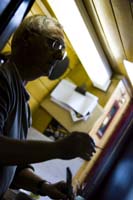Joe Scarborough
Working down the pit at Thorpe Hesley Joe at work with his paintbrush on his boat, Sheba. He took up painting after he left the mines and is now an established artist in Sheffield. © Carl Rose Before he launched on his career as an artist, Joe had a spell at Bachelor's Peas and then went to work down a pit as a coal miner. In this sound clip he describes how he became a miner. This sound clip lasts for 3 minutes and 35 seconds. So the journey from Abbeyfield Road, my father ran out of money so we finished up in Parson Cross, in an all electric flat on Buchanan Road. So just temporarily the Pitsmoor journey had finished, but I had a rich bag with me if you like, and I made one of the most momentous decisions in my life at that juncture. Because I felt ready for it, felt ready for stretching my legs, and I went to work down the pit. From £2, 14 shillings a week to £13 a week guaranteed. It was paradise. It was Rock and Roll starting off. It was the Teddy boy suit. It was learning how to drink and of course, women. You know, because you'd got the money. Which pit did you work at? It was a place called Thorpe Hesley, just outside Rotherham, and the people there were wonderful. They tret [treated] me like a spoilt brat, which I was, but I always got the impression that Lord Rowbands, in his wisdom, had put my deputy underground in place of my father and that man's name was Alan Stacey. And whenever I'd misdemean or anything like underground, that he'd hit me with a stick, which you were allowed to do under the Coal Mines and Quarries Act, or something like that. And they were wonderful, they took every little bit of snobbery out of me, and I mean I was breast fed on Socialism but I thought myself a cut above most of other people. First day down after I'd completed my miner's training at Thorpe Hesley, I wore a collar and tie, I kid you not! Down the mine? Yes, and me boots, I had all the white paint on me toe caps buffed off so they shone as if they had been polished, which of course they had been, and I presented myself in pit bottom, and up shambled this fella in a railwayman's waistcut [waistcoat] and riding britches [breeches] and boots and we eyed each other up, and I thought, 'Common working class tyke, uneducated'. He looked at me and thought, 'Spoilt brat,' you know, and he said, "Right , what's thy name?" "I am Scarborough J 643." And he went, "Right, 643," rubbing his tongue on his pencil and then says, " I tell you what, we'll call you Filey, it's easier to spell, "[laughter] and that was the beginning, chop, chop, chop, chop.
And they were splendid, they were splendid! There were two sorts of miners, there were young lads off the estate, Parson Cross was the nearest one I think, and the old miners who, when we were dashing off to work, couldn't get to work fast enough, we were bowed down as well, it's only about, even in the road ways was only about five foot high and the old miners would say, "Slow down, while we're marching we're not fighting," It was so much like listening to somebody out of the First World War on their way to the Front.
Extract from an interview with Joe Scarborough by Gaby Spinks for the Burngreave Voices oral history archive, July 2006. |
